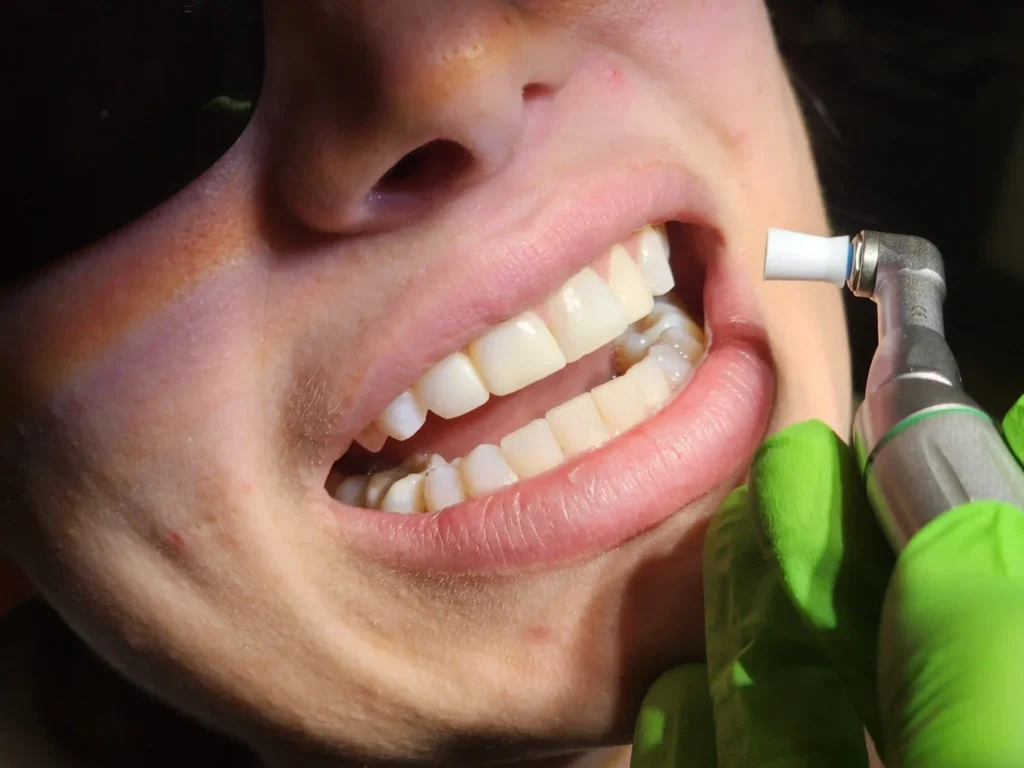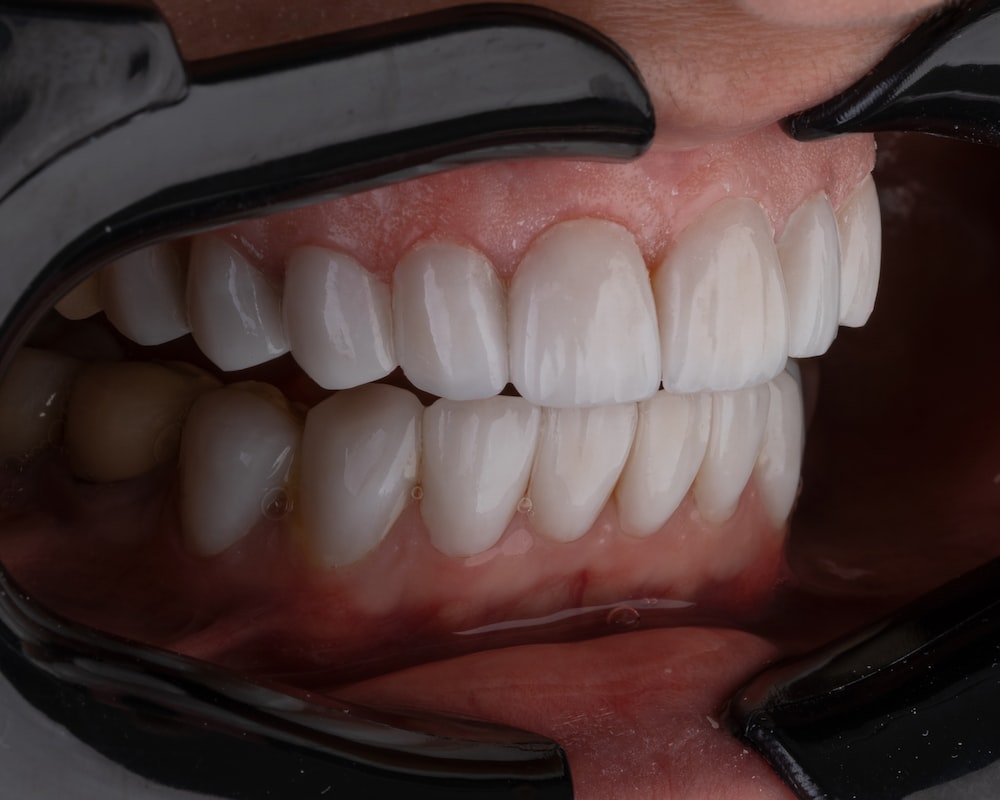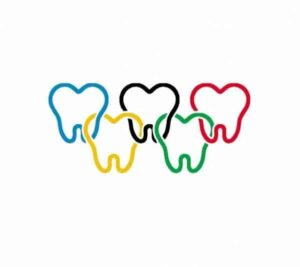Are you self-conscious about the color of your teeth? Do you wish you had a brighter, whiter smile? If so, you’re not alone. Many people struggle with discolored or stained teeth, which can impact their confidence and overall appearance. Fortunately, there are solutions available, and one of the most popular options is teeth whitening.
But before you dive into a whitening treatment, it’s important to understand if it’s the right choice for you. In this blog post, we’ll explore the causes of stained teeth, the differences between teeth cleaning and whitening, who is eligible for whitening, and what results you can expect. By the end, you’ll have a better understanding of whether tooth whitening is the solution you’ve been searching for.

Causes of Stained Teeth
There are several reasons why your teeth may become discolored or stained over time. Understanding the underlying causes can help you determine the best course of action to achieve the bright, white smile you desire.
One of the most common causes of tooth discoloration is the natural aging process. As we get older, the enamel on our teeth can start to wear down, revealing the yellowish dentin layer underneath. This can give our teeth a duller, more yellow appearance.
Another major culprit of tooth staining is the foods and beverages we consume. Things like coffee, tea, red wine, and dark-colored sauces and dressings can all leave behind stubborn stains on our teeth. Tobacco use, both smoking and chewing, is also a significant contributor to tooth discoloration.
Certain medications can also cause teeth to become discolored. Antibiotics like tetracycline, for example, can lead to a grayish or brownish hue in developing teeth. Some high blood pressure medications and antidepressants have also been linked to tooth staining.
Trauma or injury to a tooth can also result in discoloration. If a tooth has experienced any kind of physical damage, the inner structures of the tooth may become compromised, leading to a darkened appearance.
Finally, poor oral hygiene habits can allow plaque and tartar buildup, which can contribute to a yellowed or stained look. Regular brushing, flossing, and professional cleanings are essential for maintaining a bright, healthy smile.
Understanding the specific causes of your tooth discoloration can help you determine the best treatment option. If the staining is primarily due to lifestyle factors like diet or smoking, teeth whitening may be a suitable solution. However, if the discoloration is the result of an underlying medical condition or physical trauma, other treatments may be necessary.
Teeth Cleaning vs. Whitening
When it comes to addressing discolored or stained teeth, many people are unsure of the difference between teeth cleaning and teeth whitening. Both procedures can help improve the appearance of your smile, but they work in different ways.
Teeth cleaning, also known as a professional dental cleaning, is a routine procedure performed by a dental hygienist. During a cleaning, the hygienist uses specialized tools to remove built-up plaque and tartar from the surfaces of your teeth. This helps to eliminate surface stains and discoloration, leaving your teeth feeling clean and refreshed.
Teeth whitening, on the other hand, is a cosmetic procedure designed to lighten the actual color of your teeth. There are a few different whitening methods available, including:
- In-office whitening: This is a professional treatment performed by a dentist. It uses a highly concentrated whitening gel and specialized light or laser to quickly and effectively whiten your teeth.
- Take-home whitening kits: These kits contain a lower concentration of whitening gel that you apply to your teeth using custom-fitted trays. You can use them at home over the course of several weeks to gradually achieve your desired results.
- Over-the-counter whitening products: These include whitening toothpastes, strips, gels, and rinses that you can purchase and use at home. While they may be more affordable, they tend to be less effective than professional treatments.
The key difference between cleaning and whitening is that cleaning removes surface stains, while whitening actually changes the underlying color of your teeth. Cleaning can help maintain the results of whitening treatments, but it won’t address deeper discoloration on its own.
In many cases, a combination of professional cleaning and whitening can provide the best results. The cleaning helps prepare your teeth for the whitening process, while the whitening then lifts and brightens the overall color. Working with your dentist to develop a comprehensive treatment plan can ensure you achieve the sparkling, confident smile you’ve been dreaming of.
Eligibility for Teeth Whitening
Not everyone is an ideal candidate for teeth whitening. There are a few factors that can determine your eligibility and the type of whitening treatment that may work best for you.
One of the most important considerations is the underlying cause of your tooth discoloration. As we discussed earlier, stains and discoloration can be the result of a variety of factors, from lifestyle habits to medical conditions. If the discoloration is primarily due to surface stains, then whitening may be an effective solution. However, if the discoloration is the result of an underlying issue like enamel erosion or tooth trauma, whitening may not be as effective.
Your current oral health status is also a key factor. If you have any existing dental work, such as fillings, crowns, or veneers, whitening may not be able to effectively lighten those areas. Whitening also works best on natural, healthy teeth. If you have any cavities, gum disease, or other oral health problems, those will need to be addressed before whitening can be safely performed.
Your age can also play a role in your whitening eligibility. Younger patients, whose teeth are generally healthier and less discolored, tend to see the best results from whitening treatments. Older patients, whose enamel has worn down over time, may experience more limited results.
Finally, your sensitivity level is an important consideration. Whitening treatments can sometimes cause temporary tooth sensitivity or gum irritation, especially for those with already sensitive teeth. Your dentist can help determine if you’re a good candidate for whitening and recommend the safest, most effective treatment option for your individual needs.
If you’re unsure whether you’re eligible for teeth whitening, the best thing to do is to schedule a consultation with your dentist. They can examine your teeth, discuss your goals and concerns, and help you decide on the right course of action to achieve the bright, beautiful smile you desire.
What Results to Expect
If you do decide to move forward with teeth whitening, it’s important to have realistic expectations about the results you can achieve. While whitening can dramatically improve the appearance of your smile, the specific results will vary from person to person.
One of the first things to understand is that whitening treatments can’t make your teeth unnaturally white. The goal is to restore your teeth to their natural, healthy whiteness, not create an artificial, overly-bleached look. Your dentist can help you determine what your optimal shade should be based on your individual tooth color and skin tone.
The amount of whitening you can achieve will also depend on the starting point of your tooth color. If your teeth are only mildly discolored, you may see more dramatic results than someone with deeply stained or severely discolored teeth. Patients with yellow or brown stains tend to respond better to whitening than those with gray or blue-ish discoloration.
The type of whitening treatment you choose can also impact your results. In-office whitening procedures performed by a dentist usually provide the most dramatic and long-lasting results, with teeth often becoming several shades whiter. Take-home kits and over-the-counter products can also be effective, but the results may be more gradual and less dramatic.
It’s important to note that the results of teeth whitening are not permanent. Over time, your teeth may gradually start to revert back to their previous color, especially if you continue to consume staining foods and beverages. Proper oral hygiene, regular touch-up treatments, and avoiding known staining culprits can help maintain your brighter smile for longer.
If you have any existing dental work, like fillings or crowns, it’s important to understand that those areas won’t respond to whitening in the same way as your natural teeth. They may appear to stand out more once the surrounding teeth are whitened.
Ultimately, the results you can expect from teeth whitening will depend on a variety of individual factors. Working closely with your dentist to set realistic goals and understand the limitations of the procedure can help ensure you’re satisfied with the final outcome.
Conclusion
Discolored or stained teeth can have a significant impact on your confidence and self-esteem. Fortunately, teeth whitening offers a safe, effective solution for many people looking to achieve a brighter, whiter smile.
By understanding the common causes of tooth discoloration, the differences between cleaning and whitening, and your individual eligibility for the procedure, you can make an informed decision about whether teeth whitening is right for you.
Remember, the results of whitening can vary, and it’s important to have realistic expectations about what the treatment can achieve. Work closely with your dentist to develop a personalized plan that addresses your specific needs and concerns.
With the right approach, teeth whitening can help you feel more confident, attractive, and ready to take on the world with a sparkling, beautiful smile. So why not explore your options and see if this transformative treatment is the solution you’ve been searching for?
Frequently Asked Questions (FAQs) regarding teeth whitening
- Is teeth whitening safe?
Yes, teeth whitening is generally considered safe when performed by a qualified dental professional or when using approved over-the-counter products. However, it’s important to follow the instructions carefully to minimize any potential side effects, such as tooth sensitivity or gum irritation.
2. How long do the effects of teeth whitening last?
The longevity of whitening results varies from person to person. On average, results can last from six months to two years, depending on factors like diet, oral hygiene practices, and individual habits. Regular touch-ups and proper oral care can help maintain the brightness of your smile.
3. Can anyone whiten their teeth?
Most people are eligible for teeth whitening, but it’s best to consult with your dentist first. Certain factors, such as existing dental work, underlying oral health issues, or specific types of tooth discoloration, may affect your candidacy for the procedure.
4. Will teeth whitening work on crowns, veneers, or fillings?
Teeth whitening treatments typically do not affect dental restorations like crowns, veneers, or fillings. As a result, these areas may remain the same color while surrounding natural teeth become whiter, which can lead to a noticeable difference.
5. What causes tooth sensitivity after whitening?
Tooth sensitivity after whitening is a common side effect and usually temporary. It can occur due to the bleaching agents penetrating the enamel and affecting the nerve endings in the teeth. If you experience sensitivity, it may help to use toothpaste designed for sensitive teeth or consult your dentist for recommendations.
6. How many shades whiter can I expect my teeth to become?
The degree of whitening varies based on several factors, including the initial color of your teeth and the type of treatment used. In-office treatments often result in multiple shades of improvement in a single session, while take-home kits may yield more gradual results.
7. Are there any foods or drinks I should avoid after whitening?
Yes, after whitening treatments, it’s advisable to avoid foods and beverages that can stain your teeth for at least 24-48 hours. This includes coffee, tea, red wine, soda, and dark-colored sauces. Smoking should also be avoided during this time.
8. How often can I whiten my teeth?
The frequency of teeth whitening depends on the method used and your individual oral health. Professional treatments can typically be done every six months to a year, while at-home kits can be used more frequently but should be spaced out according to product instructions. Always consult your dentist for personalized advice.
9. Can I whiten my teeth if I have sensitive teeth?
If you have sensitive teeth, it’s possible to whiten them, but caution is advised. You may need to use a gentler product or consult your dentist about alternative options that are better suited for sensitive teeth.
10. What should I do if I don’t get the results I expected?
If you’re not satisfied with your whitening results, reach out to your dentist. They can evaluate your situation and provide recommendations for additional treatments or adjustments to achieve your desired outcome.
These FAQs can help address common concerns and provide clarity for those considering teeth whitening as an option for enhancing their smile.




